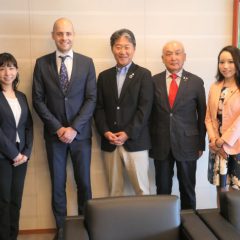☆☆☆ 3rd report of Leon Riccius, 18th scholarship holder of Grünwald foundation ☆☆☆

In these reports so far, I have mainly reported which places I visited, which events I participated in and how I spent my everyday life. After a little more than six weeks of observing, I would now like to devote myself more to Japanese culture and society and their impression on me.
There is one topic that is particularly important to me because it comes to light so often: the language barrier.
First, I am a little disappointed with my progress in learning Japanese. I had already started language courses at TUM in Germany. Altogether I have been learning Japanese for about one and a half years now. By now, I am able to communicate quite well in everyday life. I can make demands without problems for example when shopping or hold some small talk. However, when it comes to a rather unusual conversation and new situations, I struggle to follow the argument right away and often must ask questions, which makes a more in-depth exchange in Japanese almost impossible. This is a pity in itself, but it only becomes a problem because of the foreign language skills of the Japanese, which are usually even lower than my Japanese skills.
Japan’s average TOEFL test score is the second-lowest in Asia. Only Laos scores even lower. Contrarily, Japan leads the table in English language education spending. English is compulsory in Japan from middle school onwards. I have been researching a lot lately and asked young Japanese people why there is such a discrepancy between the effort involved in teaching and the actual knowledge of the language and have come across some interesting findings:
- Old-fashioned teaching: Historically, the grammar-translation method has been used most in Japan [Stewart & Miyahara 2011]. The Japanese learn English grammar and use it to translate English texts into Japanese. The widespread use of this method can be explained by the fact that in the early phases of English teaching in Japan, only a few non-fiction books or novels were available in English. Other teaching material simply wasn’t available to design the lessons. Translating into Japanese will certainly improve the understanding of the language. However, the Japanese student rarely must write texts in English or must understand spoken language. The entrance exams at the universities also mostly require knowledge of vocabulary and grammar. Consequently, a Japanese student is not motivated to go beyond what he/she learned in class.
- The island phenomenon: Already geographically the archipelago Japan shows a certain distance to the neighboring states. But especially politically Japan has closed itself off from foreign countries for a long time. Until the Meiji Restoration, the country even was completely isolated. Today, 98% of Japan’s inhabitants are ethnic Japanese. As a result, Japanese people have very little contact with people who do not speak Japanese. In Japan, Japanese media are almost exclusively consumed. In addition, they have a pop culture that is largely independent of the West. Japanese have only very few legal holidays. The many public holidays are well distributed throughout the year and are therefore not suitable for long journeys. Thus, many Japanese go on holiday in Japan. All this leads to the fact that in Japan one only rarely encounters the English language.
- Fear of change: Japanese often deny the use of English [Kubota, 2015], although this is well documented [Morita, 2017]. But there are also some who simply are reluctant to English out of conviction. There is a fear that improving the English language skills of the population will make the Japanese language skills and the importance of the language suffer. Singapore is often cited as an example, where English has been introduced as an official language and Chinese has been strongly repressed as a result. It is much more drastically formulated by Tsuda [Tsuda, 2000]. He writes that the English language is inextricably linked to cultural imperialism. So, when a better education in the English language occurs, not only the Japanese language suffers but also the Japanese culture and code of values. The representatives of this thesis may be in the minority, but it is surprisingly widely accepted.
Even before my arrival in Japan, I was often warned of the language barrier, but I didn’t really want to believe it. After spending some time in this country, I must admit that this barrier exists and is enormously high. Especially in view of the Olympic Games in Tokyo in 2020, I see this situation very critically. I hope that Japan will acknowledge this problem and take action. MEXT, for example, is a program aimed at integrating native speakers more into English lessons in Japanese schools. However, these are mostly only teaching assistants and in practice have little influence on the design of the lessons. I still see great potential here, as I assume that Japan is appealing enough to attract specialists to the country. I would also like to see a cultural change in the position of the English language. In my opinion, there is no prospect of an improvement in the situation without the pupils’ and students’ own drive to learn the language. The complexity and limited distribution of the Japanese language mean that few people in the world are learning it. Now I am fortunate to have met many Japanese people who have excellent German language skills in the surroundings of the Grünwald Foundation. Apart from that, unfortunately, an in-depth and enriching exchange has proved difficult so far.
Morita, L. (2017). Why Japan needs English. Cogent Social Sciences, 3(1), 1399783. https://doi.org/10.1080/23311886.2017.1399783
Kubota, R. (2015). Paradoxes of learning English in multilingual Japan: Envisioning education for border-crossing communication. In I. Nakane, E. Otsuji, & W. S. Armour (Eds.), Languages and identities in a transitional Japan: From internationalization to globalization (pp. 59–77). New York, NY: Routledge.
Stewart, A., & Miyahara, M. (2011). Parallel universes: Globalization and identity in English language teaching at a Japanese university. In P. Seargeant (Ed.), English in Japan in the era of Globalization (pp. 60–79). Basingstoke: Palgrave Macmillan. https://doi.org/10.1057/9780230306196
Tsuda, Y. (2000). Eigo Beta no Susume [Encouragement of Bad English]. Tokyo: Wani no NEW Shinsho.







